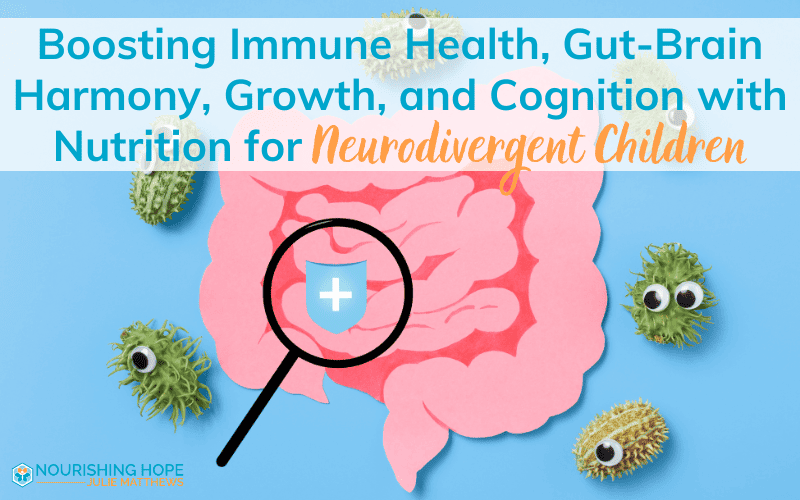
In this article on the nutrition research, we delve into five compelling studies that shed light on the interconnected realms of immune health, gut function, mental well-being, and growth during crucial developmental stages. Our exploration begins with an in-depth look at the immune system’s role in autism spectrum disorder (ASD). Moving on, we delve into the intricate relationship between inborn errors of metabolism (IEMs), genetics, and the microbiome discovering how dietary manipulations play a crucial role in these conditions and maintaining a healthy microbiome. Our exploration extends to the profound influence of the microbiome on neurological health. Next, as we address a common query about gluten intolerance and its impact on autism spectrum disorder and Down Syndrome, we discuss studies indicating genetic markers and the potential benefits of a gluten-free diet. Concluding our journey, we explore the lasting impact of a mother’s diet during pregnancy on a child’s growth.

- Could targeting the immune system improve ASD symptoms?
- Gut health and inborn errors of metabolism
- Effects of probiotics prebiotics, and phytobiotics on mental health
- The gluten-free diet, ASD and Down Syndrome
- Prenatal fish oil supplementation may improve children’s growth
Could targeting the immune system improve ASD symptoms?
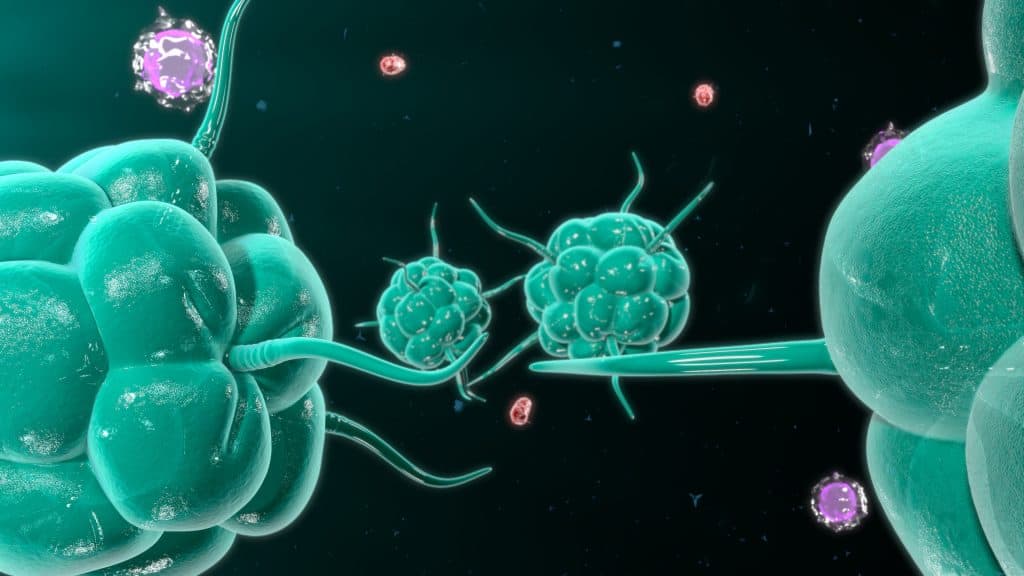
Numerous studies indicate that the immune system, which usually protects the body against foreign invaders, can malfunction in people with autism, causing ASD symptoms.
For instance, changes in the central immune system (located in the thymus and bone marrow where immature white blood cells develop) and the peripheral immune system (tissues with mature white blood cells) can lead to:
- An overstimulation of immune cells
- The production of autoantibodies (antibodies that attack the body itself)
- An imbalance in inflammatory molecules
- An increased permeability of the blood-brain barrier – this can exacerbate neurological symptoms
This research involved a review of several studies that looked at the use of various drugs and nutritional supplements in the treatment of ASD, via the immune system. The substances were studied because of their anti-inflammatory and immunomodulatory actions.
Drugs reviewed
The various drugs used showed varying results in terms of improvements in behavior, social interaction, memory, and decreased symptoms of autism based on different autism rating scales.
Supplements reviewed:
- The antioxidants sulforaphane (found in broccoli) and luteolin (found in carrots, pepper, oregano, and olive oil) were found to improve bowel characteristics, eye contact, social interaction, memory, and speaking abilities. See more on sulforaphane and DIY broccoli sprouts.
- Immunoglobulins, administered either orally or intravenously, showed improvements in digestive symptoms, attention, and hyperactivity. No changes were seen in the core symptoms of autism.
- Vitamin D and omega-3 may decrease inflammation.
- Gingko biloba is safe and well-tolerated but may not be effective in improving autistic symptoms.
- L-Carnosine appeared to improve sleep quality.
- N-acetylcysteine could help reduce irritability and aggressive behaviors.
Most of the studies were small and results may not be applicable to the whole autism population.
Journal reference: Marchezan J, Winkler dos Santos E, G, A, Deckmann I, Riesgo R, S: Immunological Dysfunction in Autism Spectrum Disorder: A Potential Target for Therapy. Neuroimmunomodulation 2018. doi: 10.1159/000492225
Gut health and inborn errors of metabolism
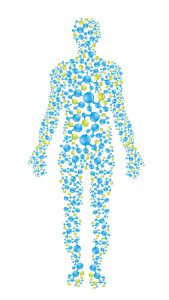
Inborn errors of metabolism (IEMs) are rare disorders involving a faulty gene that makes it difficult for the body to convert food into energy.
The treatment for IEMs typically involves dietary manipulations, which along with genetics, can influence the health of the microbiome. For instance, excessive food intake or food restriction, can lead to gut dysbiosis, an imbalance in the type and/or quantity of bacteria present in the gut.
This gut dysbiosis can further alter the metabolic state of a person with an IEM by worsening the functions of the liver and the brain, the two major organs already affected by IEMs.
As such, an unhealthy microbiome can cause:
- Neurocognitive issues (mood and behavior disorders, coordination problems, and cognitive disorders)
- Liver problems (cirrhosis and non-alcoholic fatty liver disease)
- Issues with the gut-brain interactions, increasing risks of cardiovascular risk, multiple sclerosis, Alzheimer’s disease, depression, autism, and anxiety.
Journal reference: Colonetti, Karina, Roesch, Luiz Fernando, & Schwartz, Ida Vanessa Doederlein. (2018). The microbiome and inborn errors of metabolism: Why we should look carefully at their interplay?. Genetics and Molecular Biology, 41(3), 515-532.
Effects of probiotics prebiotics, and phytobiotics on mental health
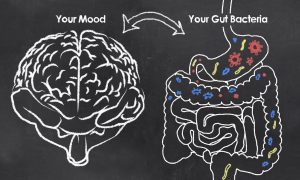
The microbiome exerts a major influence on neurological health since our brains and gut are linked. Research shows that an inflamed gut promotes the release of inflammatory molecules (cytokines) in the bloodstream. These cytokines are able to cross the blood-brain barrier and induce inflammation in the brain, creating neurological symptoms like depression, anxiety, and stress.
Improving the gut health with specific strains of probiotics can positively influence mental health. For example, Lactobacillus helveticus R0052, Bifidobacterium longum R0175, and Lactobacillus rhamnosus R0011 can ameliorate depression, anxiety, and stress respectively.
A new study shows that supplementing with probiotics, prebiotics, and phytobiotics (i.e. phytonutrients such as polyphenols) for 30 days work together to increase beneficial bacteria. This can, in turn, improve:
- Global mood
- Vigor
- Depression
- Tension
- Fatigue
- Confusion
- Anger
Journal reference: Talbott, S., Stephens, B., Talbott, J., & Oddou, M. (2018). Effect of Coordinated Probiotic/Prebiotic/Phytobiotic Supplementation on Microbiome Balance and Psychological Mood State in Healthy Stressed Adults. The FASEB Journal, 32(1_supplement), 533-85.
The gluten-free diet, ASD and Down Syndrome
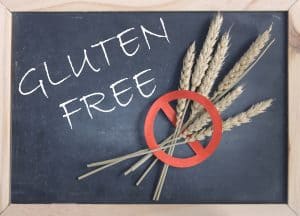
An often-asked question – do individuals with Autism Spectrum Disorder carry genetic markers of gluten intolerance?
After all, some studies indicate that gluten intolerance may cause, not only gastrointestinal symptoms, but extraintestinal issues including psycho-neurological disorders such as ASD. Moreover, the removal of gluten-containing foods from the diet has been shown to improve symptoms of ASD.
The same is true for Down syndrome: individuals have an increased intolerance to gluten and improve upon removal.
However, while there is significant science and experience from physicians on the harm associated with gluten for individual with ASD and Down syndrome, this information is slow to reach in the mainstream nutrition or medical fields to the extent is should. Therefore, additional research is always welcome.
New research looking at both Autism and Down syndrome indicates that:
- Antibodies to gliadin IgG (Antigliadin IgG) were likely present in children with ASD who consumed a regular diet as well as children with Down Syndrome.
- As expected, children with ASD who consumed a gluten-free diet are less likely to carry antigliadin IgG antibodies.
- Children with ASD and Down Syndrome were likely to have a genetic predisposition to celiac disease, indicating a sensitivity to gluten.
- Children with ASD and Down Syndrome are unlikely to carry antibodies to deamidated peptides of gliadin IgA (AntiDGP IgA).
Download our complimentary Gluten-Free Casein-Free guide
Journal reference: Bavykina, I. A., Zvyagin, A. A., Petrova, I. V., & Nastausheva, T. L. (2018). Markers of gluten intolerance in children with autism spectrum disorders and Down’syndrome. Zhurnal nevrologii i psikhiatrii imeni SS Korsakova, 118(5. Vyp. 2), 64-68.
Prenatal fish oil supplementation may improve children’s growth

A mother’s diet during pregnancy can have a profound effect on the fetus and the results can last through childhood.
A new study investigating the effects of prenatal fish oil supplements shows that children born of women who took the supplements were more likely to have healthier growth during the first six years of life.
The study involved 736 pregnant Danish women who either took daily fish oil supplements (the experimental group) or olive oil supplements (the control group). The women started the supplements from week 24 of their pregnancy until one week after delivery.
The researchers assessed the children’s height, weight, head and waist measurements 11 times from birth to age six. They found that the children’s whose mothers took the fish oil supplements had a higher body mass index throughout their first 6 years of life compared to those whose mothers received the olive oil supplements.
The higher BMI was due to a higher percentage of lean muscle and bone mass, and not extra body fat, indicating that fish oil supplements may exert a general growth-stimulating effect in utero.
Journal reference: Rebecca Kofod Vinding, Jakob Stokholm, Astrid Sevelsted, Tobias Sejersen, Bo L Chawes, Klaus Bønnelykke, Jonathan Thorsen, Laura D Howe, Martin Krakauer, Hans Bisgaard. Effect of fish oil supplementation in pregnancy on bone, lean, and fat mass at six years: randomised clinical trial. BMJ, 2018; k3312.




0 Comments